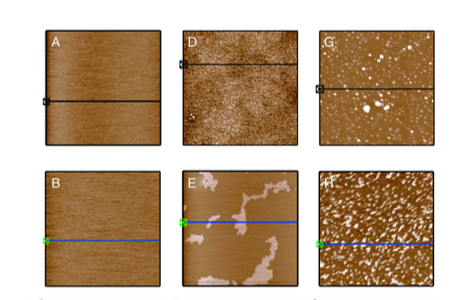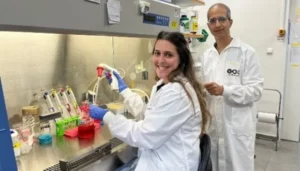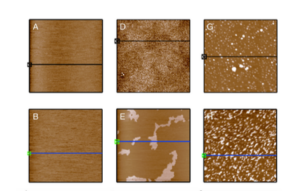Covid-19 : des étudiants de l'université de Haïfa lancent un programme de soutien aux seniors isolés

[:fr]
Les étudiants de l’Université de Haïfa, Tamar Nagler et Liat Epstein – inspirés par des événements lors du premier confinement – ont décidé de se regrouper et de mobiliser une équipe d’étudiants qui superviseront des bénévoles pour sortir la population âgée de la ville de son isolement.
«Lors du premier confinement à Haïfa, nous avons commencé à penser aux personnes âgées qui étaient soudainement dépendantes d’autres personnes et qui n’étaient pas en mesure de répondre aux besoins de base. Tout à coup, ces résidents de la ville ont été coupée de leurs proches et de leur communauté et n’ont eu aucune interaction sociale», a expliqué Nagler, une étudiante de troisième année en sciences infirmières.
«Ils avaient juste besoin de quelqu’un à qui parler, même au téléphone. Cela est vrai non seulement pendant le confinement, mais toute l’année », a ajouté Liat Epstein, étudiant de troisième année au département d’ergothérapie.
Après un programme réussi dirigé par des bénévoles en mars dernier, les étudiants ont uni leurs forces avec le doyen des étudiants de l’université et le service de protection sociale de la municipalité pour officialiser le programme.
L’Université lancera l’année universitaire 2020/2021 avec un projet pilote qui formera des étudiants à servir de coordinateurs de quartier qui travailleront avec les agents municipaux de la ville en assurant une couverture complète de Haïfa – la troisième plus grande ville métropolitaine d’Israël et la deuxième population la plus importante de citoyens âgés. Après un processus de candidature sélectif, les coordinateurs étudiants acceptés dans le programme ont reçu la nouvelle bourse de l’Université «Keeping In Touch» de 6000 NIS pour avoir accompli 80 heures de service bénévole.
Inspiré par le cours «Activist Old Age» dirigé par le Pr Israel Doron, le Dr Maayan Agmon et Shlomit Ergon de l’Université, le projet pilote espère fournir aux seniors le besoin humain le plus fondamental : le contact social.
«En plus d’aider les personnes âgées, ce projet fait également progresser la coopération entre les universités, les universités et les autorités municipales, c’est donc une victoire pour tous», a déclaré Nagler.
Chaque étudiant volontaire sera formé par le département du doyen des étudiants et travaillera en étroite collaboration avec un travailleur social afin de repérer les drapeaux rouges problématiques qui pourraient surgir pendant les efforts du volontaire. De plus, comme chaque bénévole est désigné comme une personne âgée à qui parler, il est en mesure d’établir une relation avec cette personne au fil du temps. Une fois le projet achevé cette année, les étudiants devraient venir en aide à une soixantaine de personnes âgées à travers la ville.
Actuellement, en raison des restrictions de Covid, l’interaction des bénévoles sera menée par téléphone, mais Liat Epstein et Tamar Nagler espèrent que davantage de contacts face à face seront possibles dans le futur.
«J’étais personnellement très en colère contre le premier confinement. Les personnes âgées ont été privées de leur autonomie. L’auto-isolement devrait être leur décision. Du point de vue des droits de l’homme, nous savons à quel point une personne peut se détériorer sérieusement et rapidement pendant un verrouillage », confie Tamar Nagler.
«Nous ne pouvons évidemment pas dire qu’ils peuvent sortir en toute sécurité, mais rester à l’intérieur fait également du mal. Ce projet est donc un bon compromis. Cela leur permet de rester en contact avec la communauté », a ajouté Liat Epstein.
«Nous sommes très fiers de ces étudiants de l’Université de Haïfa pour avoir mené une initiative aussi importante et avoir montré l’importance de contribuer à notre communauté», a déclaré Lisa Silverman, PDG par intérim de l’American Society de l’Université de Haïfa. «Tendre la main aux autres autour de nous est un principe fondateur de l’école et donne un excellent exemple de notre désir de renforcer nos efforts de sensibilisation communautaire ».
Traduction/adaptation Esther Amar pour Israël Science Info
[:en]
With the spread of Covid-19 across Israel, the University’s Dean of Students enlists volunteers to staff helpline for Haifa’s elderly so they can feel less alone.
As Israel grapples with its second lockdown this year in the hopes of combating the spread of Covid-19, University of Haifa is launching a student-led initiative to aid the city’s elderly population.
University of Haifa students, Tamar Nagler and Liat Epstein – who were inspired by the events that transpired in the first lockdown – decided to band together and mobilize a team of students who will supervise volunteers to help make the city’s elderly population feel a little less isolated.
“During the first lockdown of Coronavirus in Haifa we started thinking about the elderly that were suddenly dependent on other people and weren’t able to take care of basic needs,” Nagler, a third-year nursing student explained. “Suddenly, this population of the city was cut off from their loved ones and their community and were faced with no social outlet.”
“They just needed someone to talk to, even over the phone. This is true not only during lockdown, but the whole year,” Epstein, a third-year student of the school’s Department of Occupational Therapy added.
After a successful volunteer-led program in March, the students joined forces with the University’s Dean of Students and the welfare department of the city’s municipality to make the program official.
The University will kick off the 2020/1 academic year by launching a pilot project that will train students to serve as neighborhood coordinators who will work with municipal caseworkers across the city ensuring full coverage of Haifa – Israel’s third-largest metropolitan city and the second-largest population of elderly citizens. After a selective application process, the student coordinators accepted into the program received the University’s new “Keeping In Touch” 6,000 NIS scholarship for completing 80 hours of volunteer service.
Inspired by the ‘Activist Old Age’ course led by Prof. Israel Doron, Dr. Maayan Agmon and Shlomit Ergon of the University, the pilot project hopes to provide senior citizens with the most basic human need – social contact.
“In addition to helping senior citizens, this project also advances cooperation between academia, university, and municipality authorities so it’s a win all around,” Nagler said.
Each student volunteer will be trained by the Dean of Students department and will work closely with a social worker in order to spot any problematic red flags that may pop up during the volunteer’s efforts. Moreover, because each volunteer is designated a specific senior citizen to speak to, they are able to build a relationship with that person over time. Upon the project’s completion this year, it is expected that students will aid some 60 senior citizens across the city.
Currently, because of Covid restrictions, volunteer interaction will be conducted over the phone but Epstein and Nagler hope more face-to-face contact will be possible sometime in the future.
“I was personally very angry about the first lockdown,” Nagler confessed. “The elderly were stripped of their independence. Self-isolation should be their decision. From a human rights perspective, we know how seriously and rapidly a person can deteriorate during a lockdown. »
“We obviously can’t say they’re safe to go out, but staying indoors does harm as well. This project, then, is a good compromise. It enables them to still be in touch with the community, » Epstein added.
“We’re very proud of these University of Haifa students for spearheading such an important initiative and showcasing the importance of contributing to our community,” Lisa Silverman, interim CEO of the American Society of the University of Haifa, said. “Extending a helping hand to others around us is a founding principle of the school and, as such, sets an excellent example of our desire to enhance our community outreach efforts.”
[:]







